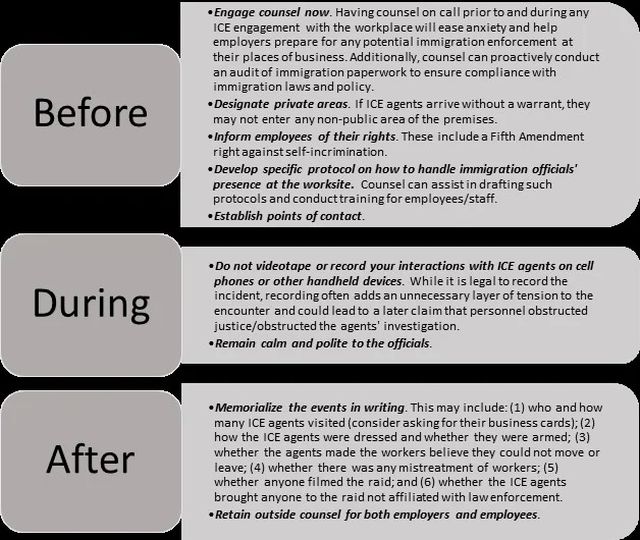Reprinted with permission from the May 2025 Business Crimes Bulletin, Copyright 2025 ALM Media Properties, LLC. Further duplication without permission is prohibited. All rights reserved.
Click here for the printable version.
Readying the Workplace for Impending Immigration Enforcement
Imagine you are the general counsel of a company that maintains warehouses across the country with thousands of employees. You know that your company is only permitted to hire individuals who are legally authorized to work in the United States, and you believe your company has instituted appropriate procedures to ensure that its workforce is legally authorized to be in and to work in the United States. But you have heard that the government is visiting warehouses like your company's to check the employment authorization of employees and potentially seeking to detain anyone the government believes may be undocumented. It is critical that you remain informed and ready to face increased scrutiny of your employees' immigration status at your places of business.
Immigration and Customs Enforcement (ICE) agents may legally come to a workplace for several reasons, including: 1) to conduct a Fraud Detection and National Security (FDNS) visit, during which government officials may seek to review documents confirming employer-sponsored visa status; 2) to perform a Form I-9 audit to confirm employees' identities and authorization to work in the U.S.; or 3) to conduct an immigration raid, during which ICE officials may seize documents and/or arrest/detain individuals. This article provides a brief primer on the processes to consider implementing in anticipation that your company may be the subject of an ICE raid, as well as steps to take if a raid occurs.
Today's Legal Landscape
Statutory Authority for an Immigration Raid
Employers and their executives, as well as any undocumented employees, may be at risk of criminal liability when ICE agents raid the workplace. Undocumented employees can be held criminally liable under 18 U.S.C. §1546 for falsifying immigration documents, and can also face detention and deportation following a raid. Employers and their executives, on the other hand, can be charged under the Illegal Immigration Reform and Immigrant Responsibility Act (IIRIRA), codified at 8 U.S.C. §1324(a)(3)(A), which states that "[a]ny person who, during any 12-month period, knowingly hires for employment at least 10 individuals with actual knowledge that the individuals are aliens ... shall be fined under title 18 or imprisoned for not more than 5 years, or both." The term "knowingly" includes "not only actual knowledge but also knowledge which may fairly be inferred through notice of certain facts and circumstances which would lead a person, through the exercise of reasonable care, to know about a certain condition." 8 C.F.R. §274a.1(l)(1) (1987). These facts and circumstances may include situations where an employer: 1) fails to complete, or improperly completes, an employee's Form I-9; 2) "[h]as information available to it that would indicate that the alien is not authorized to work, such as Labor Certification and/or an Application for Prospective Employer"; or 3) "acts with reckless and wanton disregard for the legal consequences of permitting another individual to introduce an unauthorized alien into its work force or to act on its behalf." Id. An "unauthorized alien" is one who is either not lawfully admitted for permanent residence or not authorized to work by 8 U.S.C. §1324 or the Attorney General. Id. at §274a.1(a).
Warrants for a Raid
Because employers maintain a reasonable expectation of privacy in any non-public area of their workplace as protected by the Fourth Amendment, see, Katz v. United States, 389 U.S. 347, 350–51 (1967), ICE must first obtain a judicial search warrant to raid a workplace. In that context, there are two types of warrants: judicial and administrative—but only judicial warrants actually authorize a search and/or seizure. Judicial warrants are issued by a judge after a showing of probable cause that a crime has probably been committed and that evidence, fruits, or instrumentalities of that crime will probably be found at the workplace. Administrative warrants, on the other hand, are issued by an administrative agency such as ICE and may be signed by an immigration judge or an officer of the administrative agency but do not have the same force and effect as a judicial warrant and actually do not authorize searches or seizures. Although a judicial warrant will authorize a search of the premises, ICE agents' actions are limited to the scope of the search warrant—they may not search in locations not specifically described in the warrant, seize any document or detain any individual not named in the warrant. In the event ICE agents arrive without a judicial warrant, their presence is limited only to public areas on the premises.
What to Expect
While all employers in the United States may be subject to ICE raids at the workplace, industries such as manufacturing, food processing, and agriculture often face heightened enforcement. In 2008, for example, ICE raided a kosher slaughterhouse and meatpacking plant in Postville, Iowa, arresting nearly 400 undocumented employees on criminal charges, approximately 300 of whom served prison sentences and were ultimately deported. 297 convicted and sentenced following ICE worksite operation in Iowa, U.S. IMMIGR. AND CUSTOMS ENF'T (May 15, 2008). In 2018, there were also raids of manufacturing plants across the country, including in Ohio and Tennessee, which resulted in hundreds of arrests. Worksite Immigration Raids, NAT'L IMMIGR. L. CENTER (Jan. 1, 2020). Recently, ICE arrested 16 employees at a concrete processor in Mississippi, nine employees at a pine mill in upstate New York, and approximately 20 employees at an industrial paint business near San Diego, California. See, Ximena Bustillo, "In child care centers and on farms, businesses are bracing for Vol. 32, No. 9 | May 2025 Business Crimes Bulletin 3 more immigration raids," NPR (Feb. 28, 2025); Gustavo Solis, "ICE raids El Cajon paint shop accused of knowingly hiring workers without legal status," KPBS (Mar. 27, 2025).
ICE raids in recent history have also led to the conviction of employers. In connection with the 2008 Postville raid, for example, several managers were convicted of conspiracy to harbor undocumented immigrants, aggravated identity theft, and child labor law violations. The Associated Press, "Iowa: Slaughterhouse Managers Are Indicted," N.Y. Times (Nov. 21, 2008). Additionally, following a 2007 raid of a Missouri poultry processing plant, two hiring personnel were convicted of harboring undocumented aliens and inducing undocumented aliens to remain in the U.S. See, "Missouri Processing Plant Pays $450,000 Fine for Hiring Illegal Aliens," U.S. Dep't of Justice (Sept. 15, 2009). In 2011, five senior managers of the former IFCO Systems, N.A. pleaded guilty to hiring and employing unauthorized aliens at IFCO plants across the country, and each faced six months in prison as well as a fine of $3,000 for each unauthorized alien the company hired and employed. See, "IFCO senior managers plead guilty to unlawful employment of illegal aliens," U.S. Immigr. and Customs Enf't (Sept. 15, 2011). (IFCO also reached a corporate settlement with the government in connection with its employment of undocumented immigrants, whereby IFCO agreed to pay over $20 million. See, "$2.16 million in IFCO forfeiture distributed to New York State Police," U.S. Immigr. and Customs Enf't (Oct. 25, 2011).) Similarly, in 2020, five Northern Texas businessmen pleaded guilty to knowingly hiring undocumented immigrants. See, "Texas company to pay $3 million after investigation reveals hiring illegal aliens," U.S. Immigr. and Customs Enf't (Jan. 27, 2020).
An Immigration Raid Toolkit for Employers
Given the looming threat of immigration enforcement in the workplace, employers should develop a strategy for responding to ICE visits to the workplace. The following toolkit provides concrete action items employers can take before, during, and after an immigration raid.

It's critical that you do not panic and proactively implement the steps above. Raids are scary, and having a plan in place will help reduce anxiety and prepare your company and employees for a visit from ICE. Ensuring you have experienced counsel to help you implement this toolkit and remain available should ICE come to your workplace is essential as you navigate these steps.
The content of this article is intended to provide a general guide to the subject matter. Specialist advice should be sought about your specific circumstances.



